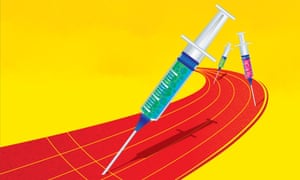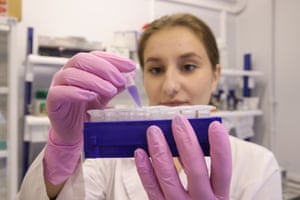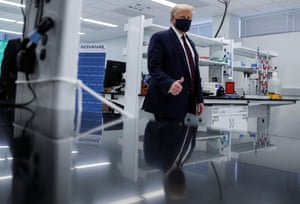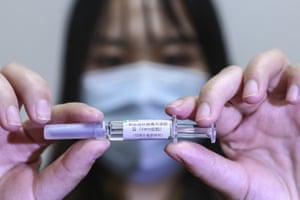
To begin with, it felt like a sleek performance from a well-honed relay team. On 11 January, only 10 days after reporting a new respiratory disease, the Chinese published the genome sequence of the virus that causes it. Researchers around the world set to work building vaccines against Covid-19, as the disease became known, and the first candidate entered human trials on 16 March; it was joined, as the months passed, by dozens of others.
Scientists were jubilant, and they had every right to be. They’d broken all vaccinology records to get to that point. But then tensions began to surface among the team members, and lately even the most distracted spectator will have noticed that they appear to be trying to nobble each other openly on the track. With accusations that the Russians and Chinese hacked research groups in other countries, biotech executives criticised for cashing in on their own, as yet unapproved vaccines, and Russia approving a vaccine that is still in clinical trials, the quest for a vaccine seems to have turned sour.
Nor is it just politicians who are in a hurry. On 2 August, Steven Salzberg, a computational biologist at Johns Hopkins University in Baltimore, Maryland, suggested in Forbes magazine that a promising vaccine be rolled out to a wider pool of volunteers before clinical trials had been completed, triggering an outcry (and some sympathy) that prompted him to recant the next day. Meanwhile, a research group with links to Harvard University continues to defend its publication in July of a recipe for a DIY Covid-19 vaccine – one that only the group’s 20-odd members had previously tested. “Out there in the real world, millions of people are getting sick and very large numbers of people are dying every day,” says group member Preston Estep, a genome scientist. “We don’t believe that our vaccine is nearly that much of a risk to people.”

The accumulation of such incidents has left many scientists feeling deeply uneasy. “I’m more and more concerned that things are getting done in a rush,” says Beate Kampmann, who directs the Vaccine Centre at the London School of Hygiene and Tropical Medicine (and whose work email account was subject to a failed hack in July). On 13 August, the editor-in-chief of the journal Science issued a call to order. “Short cuts in testing for vaccine safety and efficacy endanger millions of lives in the short term and will damage public confidence in vaccines and in science for a long time to come,” wrote H Holden Thorp.
He went on to point out that the stakes are higher than with unproven therapies such as hydroxychloroquine, because a vaccine is given to healthy people. “Approval of a vaccine that is harmful or isn’t effective could be leveraged by political forces that already propagate vaccine fears,” he warned.
Even if most vaccine research groups aren’t rushing, says Paul Offit, head of the Vaccine Education Center at the Children’s Hospital of Philadelphia, the language used to describe the search for a vaccine – the US government’s naming of its vaccine funding programme Operation “Warp Speed”, Russia’s evocation of the cold war space race with its “Sputnik V” vaccine, even the expression “vaccine race” – might imply otherwise. “It makes it sound like timelines are being suppressed, or safety issues are being ignored,” he says.
Doing things by the book, where testing a vaccine – or any medical intervention – is concerned, involves putting it through a human or clinical trial. This conventionally comprises three phases. In the first, a small group of healthy people receives the vaccine to see if it is safe – that is, that it causes no serious side effects. Phase 2 continues to test safety but mainly tests the vaccine’s ability to elicit an immune response. It does this in a few hundred people, some of whom act as controls because they receive a placebo or different vaccine. In the third phase, which also includes controls, the vaccine is typically administered to tens of thousands of people who are followed over many months, usually in a place where the risk of infection is high. This tests whether the vaccine works in the real world – that it prevents disease – and attempts to root out side effects that might not have been apparent in smaller, less diverse groups.
If an experimental vaccine is judged both safe and effective at the end of this process, it becomes eligible for approval. But it is universally acknowledged that clinical trials can’t catch all possible side effects – because some may only emerge in certain sub-populations, or after a very long time – so surveillance continues post-approval (this is sometimes referred to as a trial’s phase 4). A vaccine against rotavirus, a common cause of diarrhoea in infants, was taken off the market in 1999 after it was found to cause bowel obstruction in a small proportion of babies – something that, because of its rarity, trials had missed.
When Russia announced earlier this month that it had approved Sputnik V, the vaccine had been tested in no more than 100 people. At the time, the Gamaleya Research Institute of Epidemiology and Microbiology in Moscow – which is running the ongoing vaccine trial – had registered phases 1 and 2 in public databases, but published no results from them, and given no evidence that it had even started phase 3. And this in a country that, at least until five years ago, had by its own health ministry’s admission, standards of drug safety surveillance that were lower than those recommended by the World Health Organization (WHO). (Under-reporting of side effects was still a major problem in Russia in 2017.)
Philosopher and bioethicist Angus Dawson, who works at the University of Sydney, says he understands the pressure to accelerate Covid-19 vaccine testing, given the numbers of people globally who are susceptible to severe or lethal forms of the disease. But he thinks it has blinkered some scientists to the dangers of rushing trials. “They’re focusing on potential benefits without reasonably and fairly thinking about the downsides,” he says.

Covid-19 is not flu. It is caused by a virus, Sars-CoV-2, about which relatively little is known, and some of the experimental vaccines currently going through clinical trials also make use of novel technology. That is a lot of unknowns. “We don’t have a vaccine for any coronavirus, so why do people assume this is going to be straightforward?” Dawson asks.
One potential risk with some kinds of vaccine, for example, is that they can cause the recipient to experience a worse bout of the disease if that person becomes infected naturally later on. This phenomenon, known as antibody-dependent enhancement (ADE), has been a problem with experimental vaccines against severe acute respiratory syndrome (Sars) – which is caused by a virus related to Sars-CoV-2 – and it will need to be ruled out by rigorous testing of vaccines against Covid-19.
If ADE were to turn out to be a problem with a vaccine after it had been approved, in a country with poor safety reporting, years might pass before the full human cost came to light. This is a dilemma currently exercising the Africa Centres for Disease Control and Prevention, which is working with Covid-19 vaccine developers to set up phase 3 trials in Africa. Covid-19 outbreaks are now growing in parts of that continent, meaning it is potentially a good place to test the ability of a putative vaccine to protect people against infection, but safety surveillance can be patchy there. “Often where you have most cases of an infectious disease, the infrastructure for surveillance isn’t as good,” says Kampmann.
When Salzberg rescinded his suggestion to roll out a vaccine before trials had been completed, ADE was one of the reasons. “I have concluded that (1) the risks are greater than I presented them, and (2) the benefits are not as great as I had thought,” he wrote.
But unknowns are just that, meaning that experts disagree about how much speed is justified in the current situation. Dawson argues that the existing, sequential system of trial phases should be maintained, partly on moral grounds: safety should be fully established before efficacy, for example, and if it hasn’t then a volunteer giving “informed” consent to take part is less informed than she should be. But the WHO and the Oslo-based nonprofit organisation the Coalition for Epidemic Preparedness Innovation (Cepi) – which is helping to coordinate Covid-19 vaccine development – have both endorsed a “pandemic paradigm” in which some phases are run in parallel and trial duration is shortened overall. The front-running Oxford University/AstraZeneca vaccine (see graphic, below) is one of a number of projects running phase 2 and 3 trials simultaneously.
The justification for doing so is that all of the usual checks and balances will still be performed before a vaccine is used widely; they just might not be performed in the same order. The cost of compressing the process is a greater financial risk for vaccine-makers, since it requires them to move forward through ever more expensive trial phases before all the information is in from previous ones – with no guarantee of approval at the end. It’s for this reason that Cepi, Warp Speed and others are investing public money in Covid-19 vaccine research – to help spread that risk.
Andrew Lo, an economist at the Massachusetts Institute of Technology, applauds this development. He points out that companies have been fleeing the vaccine field in recent decades, because the profit margin on most vaccines is so thin. “The fact that we now have more companies getting into the vaccine business because of Covid-19 is a tremendously positive aspect of this pandemic,” he says.

But the changing economics of vaccine development have thrown up new ethical dilemmas. Nobody is suggesting that executives at Moderna and Inovio – US biotech firms working on experimental Covid-19 vaccines using technology that has never been approved – broke any rules when they sold off stock in their own companies. This is normal practice, once companies go public, partly because it allows executives to recoup their initial investment. But Lo says legal scholars are currently debating whether those rules remain fit for purpose. And while the scholars debate, the spectacle of execs cashing in on unproven technology that taxpayers helped fund – in the middle of a pandemic, to boot – does nothing for public trust in scientists. “It creates a cynicism that’s understandable,” says Offit.
The bad behaviour has repercussions. Now that seven candidates are in phase 3 trials, ensuring the equitable distribution of any that are approved has become a pressing issue. A few weeks ago Cepi published the results of a survey suggesting that the world had the manufacturing capacity to produce the 2bn doses considered necessary to protect the most vulnerable by the end of 2021 – without borrowing capacity from other lifesaving vaccines – but not to produce enough doses to protect everyone by the same deadline. “People are waking up to the fact that vaccines will not be there for all,” Kampmann says.
The spectre arises of nations already engaged in a vaccine “space race” trying to corner supplies for their own populations. In fact, some have already started doing so, prompting the WHO in early August to warn against “vaccine nationalism”. To counter this, in June, Cepi, the WHO and Gavi, the Vaccine Alliance, set up the Covid-19 Vaccines Global Access (Covax) facility, with the aim of persuading as many governments as possible to invest in vaccine development in exchange for enough doses of an eventually approved product to cover the most vulnerable 20% of their populations.
To date, 172 countries have expressed an interest in Covax. They include the UK, but not China, Russia, the US or the European Union. The deadline to commit is the end of August. Gavi CEO Seth Berkley says he hopes common sense will prevail, and specifically the realisation that nobody is safe until everybody is safe. “To go ahead and cut the final deals, though, we need to know how many countries are going to be in and to have them put in the money up front,” he says.
History doesn’t give much reason to be hopeful. “In keeping with the longstanding pattern of political behaviour during pandemics,” wrote global health expert David P Fidler of the Council on Foreign Relations in Washington DC, in Science on 14 August, “vaccines will eventually reach most populations, but only after powerful countries have protected themselves.”
Another potential repercussion is that, having lost faith in science and institutions, more people will choose not to take a vaccine once one becomes available – reducing the protection of the population as a whole if herd immunity cannot be achieved. (Herd immunity is when enough people are vaccinated that they block the disease’s spread, so that even the unvaccinated are protected.) Alarming surveys have suggested that up to a third of Americans and 16% of Britons would refuse a Covid-19 vaccine, for example. Offit warns that such surveys should be treated with caution, however, while the vaccine remains theoretical. “If you ask me, would I get a Covid-19 vaccine, my answer would be, not until I’ve seen the data,” he says. “People are sceptical and they should be sceptical.”
If a vaccine is shown to be safe and effective, through rigorous application of the scientific method, Offit is optimistic that most people will take it. Kampmann, meanwhile, feels it’s important not to let the recent shenanigans in the vaccine community overshadow its huge achievements. If current forecasts are correct, a Covid-19 vaccine will be available in 2021 – smashing all records for vaccine development – and there will be many more reasons to trust it than not to. Still, those with their eye on that glittering prize should remember what is at stake. “We have to be careful,” she says, “because what we do with Covid-19 could have repercussions for trust in all vaccine programmes.”
• Laura Spinney is the author of Pale Rider: The Spanish Flu of 1918 and How It Changed the World (Vintage, £10.99). To order a copy go to guardianbookshop.com. Delivery charges may apply.

No comments:
Post a Comment